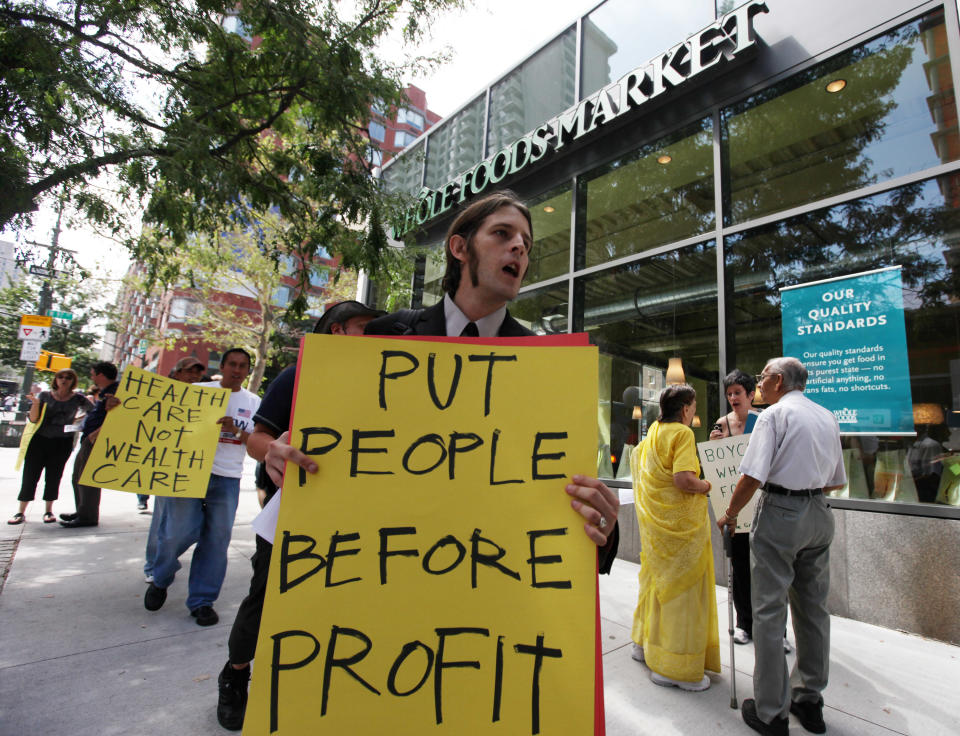Whole Foods to bring back employee stock option program after calls to unionize
A week after some Whole Foods employees called to unionize, the Amazon-owned grocery chain vowed to improve employee benefits and company culture by introducing new programs in the first half of 2019, according to a letter reviewed by Yahoo Finance.
In a letter to employees on Wednesday, John Mackey, the CEO and co-founder of Whole Foods, said he recognizes “a great deal of concern that our culture will fade or be changed beyond recognition as we integrate with Amazon.” Notably, Mackey addressed an issue many employees have been concerned with — stock options, noting that Whole Foods will create an Amazon (AMZN) equity program for all employees with at least 6,000 service hours.

The policy is in-line with a Whole Foods’ practice prior to Amazon’s acquisition, when workers with at least 6,000 actual service hours were eligible to receive stock that could vest over four years, according to internal documents reviewed by Yahoo Finance. Earlier this year, Amazon granted Restricted Stock Units (RSUs) to only Whole Foods leadership above the Associate Store Team Leader level, leaving many employees in stores empty-handed. Amazon stock price has doubled since the e-commerce chain bought Whole Foods last August.
This is also the centerpiece of employees’ demands as they call to unionize. Mackey said he has heard from many Team Members who expressed disappointment about the issue, but he made no mention of the unionization effort.
Whole Foods didn’t respond immediately to a request for comment.

Employees who sent out a letter calling for colleagues to unionize across the country last Thursday said they haven’t heard anything from Whole Foods’ management. They said the return of the stock option program is an encouraging move, but more needs to be done to improve workers’ rights. So far, hundreds of employees have joined the group and they are figuring out the next move to unionize.
Peter Cappelli, a professor of management at the Wharton School says the stagnant wage growth has pushed retail workers to unionize so that they could negotiate for better benefits. “Until recently, retail employees have not seen wages go up at all and they’ve seen benefits cuts. In particular, what caused people to want to organize is when there are changes,” said Cappelli. “If they start to take away things from you, you begin to feel really upset.”
Mackey also introduced other new endeavors to engage employees, including a Cultural Champions program and Leadership Training program to “increase Team Member Growth and Happiness” as well as offering them more opportunities to move up.
He emphasized the positive changes Amazon has brought to Whole Foods, including price cuts, reversing the trend of declining store sales, and integrating the grocer into the Prime ecosystem. The premium grocery chain, which once slowed down expansion, plans on fast-tracking the opening of new stores, according to the letter.
“While we have many valuable things to learn from Amazon, we’re always going to preserve the very best of Whole Foods,” Mackey wrote. “We see tremendous potential for our Team Members in the future as we continue to innovate and grow with Amazon.”
Do you work for Amazon/Whole Foods? We’d love to hear your experience. Drop us a line via [email protected] or follow Krystal on Twitter.
Read more:
Amazon bought Whole Foods a year ago. Here’s what has changed
